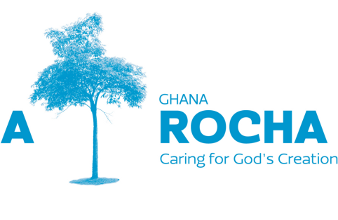Influencing Businesses to Protect the Environment
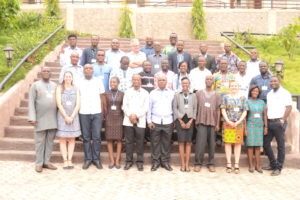 Globally, environmental sustainability has become an important issue that is gaining a lot of attention from the media and from different governments across the globe. This is as a result of the amount of research going into assessing the impacts of human activities on the environment. Although the long term implications of this serious issue is yet to be fully understood, it is generally agreed that the risks are high enough to merit some quick environmental safeguards.
Globally, environmental sustainability has become an important issue that is gaining a lot of attention from the media and from different governments across the globe. This is as a result of the amount of research going into assessing the impacts of human activities on the environment. Although the long term implications of this serious issue is yet to be fully understood, it is generally agreed that the risks are high enough to merit some quick environmental safeguards.
Businesses through their operations are identified as one of the biggest contributors to environmental degradation. They also find themselves in a fiscal niche to make significant differences in minimizing environmental damage. For much of the past, most businesses have acted with little regard or concern for the negative impacts they have on the environment.
The situation in Ghana with regards to businesses and the environment is no different. However, A Rocha Ghana together with the Development Institute of Ghana (DI) is championing a paradigm to rope in businesses to commit to environmental sustainability and work towards achieving low environmental degradation through their activities.
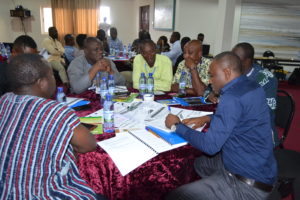 This action is supported under the ‘Dialogue and Dissent’ programme and in partnership between the Dutch Ministry of Foreign Affairs, International Union for the Conservation of Nature, Netherlands (IUCN NL), and World Wildlife Fund, Netherland (WWF NL) through the Shared Resources,Joint Solutions programme (SRJS). The programme is supporting civil society organizations (CSOs) to lobby and advocate for the adaption and implementation of sustainable policies and practices by communities, businesses and government.
This action is supported under the ‘Dialogue and Dissent’ programme and in partnership between the Dutch Ministry of Foreign Affairs, International Union for the Conservation of Nature, Netherlands (IUCN NL), and World Wildlife Fund, Netherland (WWF NL) through the Shared Resources,Joint Solutions programme (SRJS). The programme is supporting civil society organizations (CSOs) to lobby and advocate for the adaption and implementation of sustainable policies and practices by communities, businesses and government.
Training for CSOs in Business Engagement
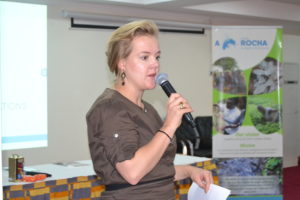
Romie Goedicke, IUCN- Netherlands
As part of activities under the Shared Resources, Joint Solutions initiative, a two day training workshop was organized to build the capacities of civil society organizations(CSOs) in business engagement strategies. The workshop aimed at helping CSOs increase their influence in multi-stakeholder partnerships with governments and business, and strengthen their leverage in successfully advocating for inclusive green development.
During the two-day workshop held on 25-26 October in Ho in the Volta Region of Ghana, 30 participants came together to learn and share experiences. The participants included representatives from 22 national and regional CSOs, Ghana Environmental Protection Agency, Private Sector Federation as well as Blue Skies Fruit Company in Ghana.
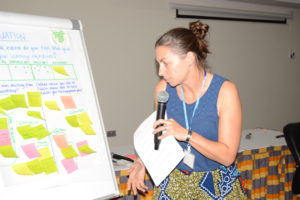
Nadine McCormick, IUCN
The training was facilitated by Romie Goedicke, Senior Expert on Green Economy with IUCN-NL and Nadine McCormick with the Global Business and Biodiversity Programme IUCN.
Participants working in groups also shared perspectives on their own organizations and developed business cases for action. A “Dragon’s Den”-style panel was held to promote the best examples. The winner of the panel was Dorcas Gyimah Owusu from IUCN Ghana, who reflected: “I have been enlightened on how to engage businesses. The momentum is high, so we now need to work on implementing our plan.”
Three collective engagement strategies were defined; one at a national level targeting extractives and two at a landscape level targeting a fruit producer in the Mole landscape and a forestry products company in the Weto landscape. Participants developed action plans as forward-looking steps to engage businesses within their landscapes at the end of the training program.
“This programme has brought a new dimension to CSO engagement in Ghana,” says Charles Agboklu with the International Research and Development Institute, Ghana.
It is envisaged that this training will catalyze the drive to get companies to appreciate the importance of nature and manage their operational impacts on the environment.
